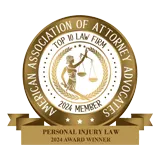Vertigo after a car accident is a real problem – here’s what to do next

Get a fair settlement for vertigo-related injuries caused by negligence
If you’re experiencing dizziness following a car accident, you’re not alone. After a collision many victims experience vertigo, which can be caused by different types of injuries, commonly:
- BPPV vertigo
- Whiplash vertigo
- Head injury/concussion vertigo
Vertigo isn’t limited to dizziness. There are many different symptoms associated with vertigo that may require medical treatment and prevent you from returning to work. Don’t let the consequences of another driver’s mistake ruin your health and financial future.
Steve Caya is an experienced injury attorney who helps Wisconsin accident victims win fair compensation for their injuries. He works with a network of experts, including doctors and accident investigators, to prove how another person’s negligence caused the crash and your injuries.
Learn more about the causes and types of vertigo after a car accident, and contact our law firm to schedule a free, no obligation injury claim review.
Post-traumatic vertigo
Post-traumatic vertigo is frequently experienced after sustaining injury to the head or neck in a car accident.
Common symptoms of post-traumatic vertigo include:
- Lightheadedness
- Balance problems
- Nausea and vomiting
- Blurry vision
- Difficulty walking
- Motion sickness
- Ringing in the ears (tinnitus)
- Headaches
- Nystagmus, or uncontrollable eye movements
The most severe effects of post-traumatic vertigo typically last a few hours or day, but symptoms may take 3 to 6 weeks to disappear completely. Unfortunately, some car accident victims continue to suffer chronic vertigo symptoms without relief.
Because post-traumatic vertigo can take any number of weeks or months to resolve, it’s important not to accept a settlement offer too early. Make sure the full scope of your injuries has been diagnosed by a doctor, and speak to an injury attorney about what a fair settlement should look like.
You only have one chance to claim fair compensation, and after you sign you can’t seek any further payments, even if you’re out of work or needing medical care for far longer than you anticipated.
Post-traumatic Meniere’s disease
Post-traumatic Meniere’s disease (also called post-traumatic Meniere’s syndrome) occurs when the fluid balance in your inner ear is disrupted.
Symptoms of post-traumatic Meniere’s include:
- Tinnitus (ringing in the ears)
- Ear “fullness”
- Hearing loss
- Periods of dizziness
Post-traumatic Meniere’s disease is not often reported after car accidents. This could be in part due to the nature of the symptoms, which can make a definitive diagnosis difficult to arrive at. In general, the more severe the head or neck injuries, the more likely post-traumatic Meniere’s disease. Some accident victims have a pre-existing condition that puts them at higher risk for developing post-traumatic Meniere’s syndrome.
Treatment for Meniere’s
There is no cure for Meniere’s disease; it is a progressive disease and will worsen with time. Some victims will experience periods of remission, where the symptoms disappear for no apparent reason. Many people with Meniere’s disease experience some permanent hearing loss eventually. While there isn’t a cure for Meniere’s disease, a doctor can recommend ways to manage your symptoms.
If you’ve been diagnosed with post-traumatic Meniere’s disease following a car accident, the aftermath could last a lifetime. Another driver has changed your life forever – you deserve compensation. Speak with a personal injury attorney to learn how you can be made whole again.
Benign paroxysmal positional vertigo
Benign paroxysmal positional vertigo (BPPV) is caused by a complication in your inner ear. Small calcium “stones” exist in your inner ear canals to help you maintain your balance. When head trauma causes the displacement of these stones, you’ll experience severe dizziness or vertigo.
Common symptoms of benign paroxysmal positional vertigo include:
- Spinning or tilting feeling
- Dizziness
- Unsteadiness
- Nausea
- Vomiting
Mild to severe BPPV after a car accident is not uncommon. BBPV can be difficult to treat, and symptoms may come and go with some episodes lasting less than a minute. BPPV symptoms can also disappear for longer periods of time and then return.
Treatment for benign paroxysmal positional vertigo
Sometimes benign paroxysmal positional vertigo resolves on its own. If not, you may need professional medical treatment to relieve your symptoms. Always see a doctor to diagnose your vertigo after an accident, to protect your health and your injury claim.
Treatments for BPPV can include:
- Canalith repositioning includes different procedures to maneuver your head position
- Surgical methods may be recommended to plug your semicircular canal and stop dizziness
- Medication may be prescribed to treat severe nausea and/or vomiting associated with BBPV
If you’ve sustained BPPV after a car accident that someone else caused, you may be entitled to compensation for medical costs and other losses. Consult an injury attorney to learn what a fair settlement for your claim might look like.
Whiplash and vertigo
Whiplash is a neck injury caused by forceful, rapid movement of the neck. Whiplash is common in rear-end collisions and other types of car accidents.
Can vertigo be caused by whiplash?
Whiplash vertigo is common after a car accident, and can have a major impact on your life.
Vertigo is commonly caused by whiplash, reported in approximately 25-50% of whiplash cases. The type of vertigo caused by whiplash is typically cervical vertigo. Cervical vertigo happens when a specific neck position or movement causes dizziness, regardless of head position. Dizziness from whiplash can last for years, though the majority of people with whiplash vertigo recover within a year.
Whiplash can also cause balance problems, cervical neck pain, TMJ, headaches and scapulodynia (pain in the shoulder blades).
How is cervical vertigo diagnosed and treated?
If you have neck pain and dizziness after a car crash, don’t ignore it. Get your symptoms checked out by a doctor ASAP. Ignoring whiplash vertigo could lead to more serious issues and hurt your chances of getting a fair settlement for your injuries. To diagnose whiplash vertigo, your doctors will perform a physical examination requiring you to turn your head. Additional tests for cervical vertigo include an MRI scan of the neck.
Treating cervical vertigo will depend on the underlying cause of your injury. Doctors may prescribe medication to relieve neck tightness, dizziness and pain. Your doctor may recommend physical therapy to improve your range of motion and learn stretching techniques. Chiropractic services may also be recommended to decrease your symptoms.
All of these tests and treatments cost money – money you’ll be on the hook for unless you receive an adequate settlement. Contact a personal injury attorney with the resources to fight for fair compensation.
Head and brain injury can cause vertigo after a crash
Some head and traumatic brain injuries (TBI) sustained in a motor vehicle collision can cause vertigo, including:
- Concussion
- Subdural hematoma
- Diffuse axonal injury
- Coup-contrecoup head injuries
- Edema
- Vestibular injuries
What causes vestibular vertigo?
The vestibular system is made up of your body’s inner ear and portions of the brain used to process sensory information. Together, your vestibular system helps you control your balance and eye movement. Damage to this system constitutes vestibular injury.
Vestibular injury is common in car accidents because of the trauma imposed on your body and brain in the collision. Vestibular vertigo can arise immediately after the crash, or with delayed onset.
Symptoms can last for up to 2 years in some cases and include:
- Difficulties with balance
- Hearing or vision complications
- Dizziness or vertigo
Don’t pay for another driver’s negligence. Speak to a personal injury attorney for free to learn about your options for financial recovery.
Is it normal to have vertigo months after a car accident?
Some individuals with post-traumatic vertigo report symptoms lasting up to 2-5 years or even longer. Chronic vertigo caused by a car accident is not unheard of.
If you’re suffering vertigo from a car accident, you could be dealing with the effects for longer than you think – possibly the rest of your life. Medical bills will add up as you search for ways to relieve your suffering. Don’t be stiffed out of real compensation by signing a settlement. Talk to a trial attorney and fight for the compensation you deserve.
Getting a fair settlement for vertigo after a car accident
A skilled personal injury attorney can be the single biggest factor affecting your vertigo injury settlement amount.
The insurance company for the driver who wrecked your life and caused your vertigo wants you to settle ASAP for as little money as possible. To make sure you get fair compensation, you need to:
- See a doctor immediately to get treated and document the full extent of your injuries.
- Don’t sign anything – settling too quickly can put you in a painful financial position down the road.
- Lawyer up – signal your intent to fight for the settlement you deserve.
Because vertigo and vertigo-related injuries can take time to present fully, the negligent driver’s insurance company will look for any possible reason to minimize or deny your claim. Despite all the tactics they’ll use to pay out as little as possible, you’re entitled to full compensation for injuries caused by someone else.
The best way to show an insurance company you won’t be disregarded is to hire a lawyer. Steve Caya works hard to strengthen his clients’ claims by working with all necessary specialists to prove the cause, extent, and expected future costs of the injuries.
In Wisconsin, the statute of limitations for vertigo injury claims is three years from the date of the accident. The longer you wait to contact an attorney, the more evidence slips away and the harder it becomes to build a strong case. The at-fault driver’s insurance company is happy to run out the clock – they know when your opportunity to file a lawsuit expires, you’ll be stuck with whatever settlement about they’re willing to offer.
Steve Caya fights for fair compensation for vertigo & related injuries
Victims of car accidents trust Steve Caya to make them whole again. As a former insurance industry attorney, Steve Caya knows exactly how insurers will try to cheat you out of fair compensation, and what it takes to make them pay.
What happened as a result of the crash can’t be undone – but you’re not alone.
Contact me today for a free consultation.


















